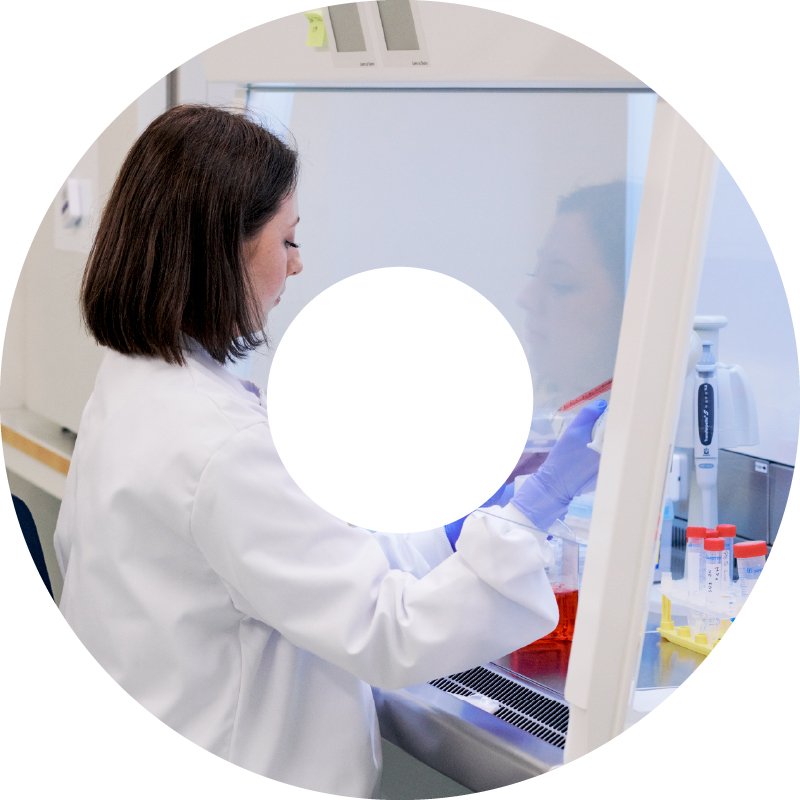
A pinpoint solution to cancer treatment
In collaboration with Ambusol, we are leveraging Fluicell’s unique open volume microfluidic technology to create new ways to treat cancer. Together, we are working to create high precession solutions to one of the leading causes of death in the world.
Treating cancer with precision
Cancer is responsible for more than 10 million deaths annually, making it the second most common cause of death in the world after cardiovascular diseases.1 Cancer is also a steadily growing health concern with an expected increase in the number of cases between 2022 and 2050 of approximately 77 percent.2
Despite remarkable progress in developing new anti-cancer therapeutics, the outcome for patients with solid tumors is still unsatisfactory, in part due to challenges associated with drug delivery and uptake. To address this challenge, Fluicell and Ambusol are partnering to create a catheter device based on Fluicell’s open volume microfluidic technology to enable local delivery of anti-cancer agents directly to the cancer environment. This way, it is possible to dramatically produce higher drug concentration specifically in the tumor tissue, without producing a general increase in concentration that might damage other organs.
Thanks to Fluicell’s microfluidic recirculation technology, delivery of anti-cancer agents to the tumor environment can be combined with simultaneous removal of cellular debris and other waste materials.

Targeting glioblastoma, the most severe form of brain tumor
The partnership between Fluicell and Ambusol covers five important cancer indications: glioblastoma, prostate cancer, breast cancer, skin cancer, and pancreatic cancer. The first development target is glioblastoma (GBM), a highly aggressive form of brain cancer that affects approximately 300,000 people each year.3
Glioblastoma, also known as glioblastoma multiforme, is the most aggressive and most common form of brain cancer, representing roughly 50 percent of all malignant brain tumors. Even with treatment, the median overall survival is only approximately 15 months, with a five-year survival rate of less than five percent.3,4
The resistance of the tumor cells to conventional therapies, paired with the brain’s susceptibility to damage from the treatment, makes glioblastoma particularly challenging to treat. Through the combination of Fluicell’s high precision recirculation technology combined with Ambusol’s innovative therapeutic solution, we are addressing both these challenges to create a new way to treat one of the most aggressive forms of cancer.
- Ability to replicate complex microenvironment and interplay between the cell types beyond simple cardiomyocyte monoculture
- Ability to Replicate role for each cell type in maintaining homoestasis and restoration of function upon acute damage or toxic exposure
- Accurate representation of the organ tissue composition
- Having repeatable on-demand tissues to fit into regulatory systems
50%
5%

References
- International Agency for Research on Cancer – Cancer today. Accessed August 14, 2025. https://gco.iarc.fr/today/en
- WHO - Global cancer burden growing, amidst mounting need forservices. Accessed August 14, 2025. https://www.who.int/pitcairnislands/news/detail-global/01-02-2024-global-cancer-burden-growing--amidst-mounting-need-for-services
- Tamimi AF, Juweid M. Epidemiology and Outcome of Glioblastoma. In: De Vleeschouwer S, editor. Glioblastoma [Internet]. Brisbane(AU): Codon Publications; 2017 Sep 27. Chapter 8. PMID: 29251870
- Grochans, S.; Cybulska, A.M.; Simińska, D.; Korbecki, J.;Kojder, K.; Chlubek, D.; Baranowska-Bosiacka, I. Epidemiology of Glioblastoma Multiforme–Literature Review. Cancers 2022, 14,2412. https://doi.org/10.3390/cancers14102412


Get in touch!
Want to learn about how we’re taking on cardiovascular disease?
Read more

Pipeline
Our pipeline consists of products based on our tissue production platform, including tissue-based therapeutics for type 1 diabetes treatment, and cardiac toxicity and kidney disease screening models.

our platform
Learn more about Nexocyte, Fluicell’s universal tissue production platform, based on our high-resolution single-cell bioprinting technology Biopixlar.
